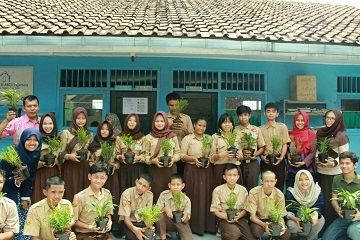Understanding and Responding for Children with Special Needs, A Group of IPB Students Established “Edulurs” Educational Program

Children with Special Needs (ABK) are defined as children who are slow or have problems that will never succeed in school like children in general. Special needs is a term used in clinical diagnostic and functional development to describe individuals who require assistance for disabilities that may be medical, mental, or psychological. ABK is also defined as a child who has physical, mental, intellectual, and emotional disturbances that require special learning. Children with disabilities encounter different forms of exclusion and are affected by them to varying degrees depending on the type of disability they have, where they live and the culture or class to which they belong.
Everyone, without any discrimination, has the right to equal education. No exception for children with special needs. Education for them has been regulated in Law No. 20 of 2003 on the Implementation of Special Education for Learners. In article 127 states, "Special education is education for learners who have difficulty in following the learning process because of physical, emotional, mental, social, and / or have potential of intelligence and special talent".
The existence of ABK is still often underestimated, students with disabilities were educated separately from their age peers in either special schools or different classes. Although education for ABK has been ensured in the Act, there are still many special schools of ABK or Sekolah Luar Biasa (SLB – special schools for disables) that do not provide the same material content as other general education classrooms. Even where children share the same disadvantages, children with disabilities confront additional challenges as a result of their impairments and the many barriers that society throws in their way. In addition, injustices faced by the those living with impairments and disabilities the schools do not incorporate environmental education and forestry for their subjects. Children thus excluded are unknown to, and therefore cut off from, public services to which they are entitled.
Realizing the important of providing equal educational opportunity for children with special needs, five students of the Faculty of Forestry of Bogor Agricultural University (FAHUTAN IPB), namely Aris Ahmad Wiratama, Anis Tri Rahayu, Mays Neneng Saputri, Dini Nur Aisah, and Iqbal Fauzi initiative tried to incorporating environmental education and forestry for those disables children through the “Edulurs” program. “Edulurs” stands for Edukasi Peduli Lingkungan Hidup untuk Anak Berkebutuhan Khusus (= Environmental Education for Children with Special Needs). ABK's limitations are not a justification for environmental education. Precisely it is very important to be taught in order to form mental and good character. Children with Special Needs or disabilities deserve equal opportunity in education, including environmental education and forestry.
In fact, environmental education and forestry are usually provided for normal people only. It is due to the assumption that ABK only needs to learn how to live independently. Often their needs are not recognised and they are thought to have little to contribute to their community. In reality, public awareness of the Indonesia community on environment and forestry degradationare still very low. Therefore “Edulurs” expected to improve environmental awareness that their effort to respond ABK needs will become the pioneered program to improve the awareness environment & forest protection.
Given opportunities to flourish as others might, children with disabilities have the potential to lead fulfilling lives and to contribute to the social, cultural and economic vitality of their communities. Children with such special needs are usually entitled to receive additional services or accommodations through the public schools. There they get additional services like special instruction, either in the classroom or in a separate room. Or they might get special accommodations, such as extra time on tests. Accordingly, the educational pattern for ABK's as planned by IPB group must be designed in a special methods, the group must be very pattern in designing the education program for ABK. Discrimination based on disability has manifested itself in marginalization from resources and decision making, and even in infanticide. According to one of the lecturers in SLB, so far the most effective pattern is through practice and directly linked to the environment. This pattern of teaching is also applied by Aris and his four colleagues in the “Edulurs” program. They directly invite the Children with Special Needs to observe the environment, then the group introduced trees and animals, the use of land by planting, and the introduction of other natural resources. The hope, when they are familiar children become socially responsible and show respect for the environment.
Currently, “Edulurs” program is carried out at SLB ABCD Sejahtera in Bogor City. This program has been running for three months, and 20 (twenty) disabled children participated in the program. The participants consisted of 1 (one) blind, 2 (two) mentally disabled, and the rest were deaf children. The group who are from the Faculty of Forestry worked together with the respective school teachers to carry out this program. Before the special educate begins, the group first provide special educate the teachers. The transfer of knowledge process is also assisted by the teachers who are actively involved. Aris hopes this program will continue and produce quality environmental ambassadors, who will inspire other school for Children with Special Needs. Finally, Aris also expected that in the near future other “Edulurs” program can expanded in other parts of Bogor, and Indonesia as well. (Wied)



